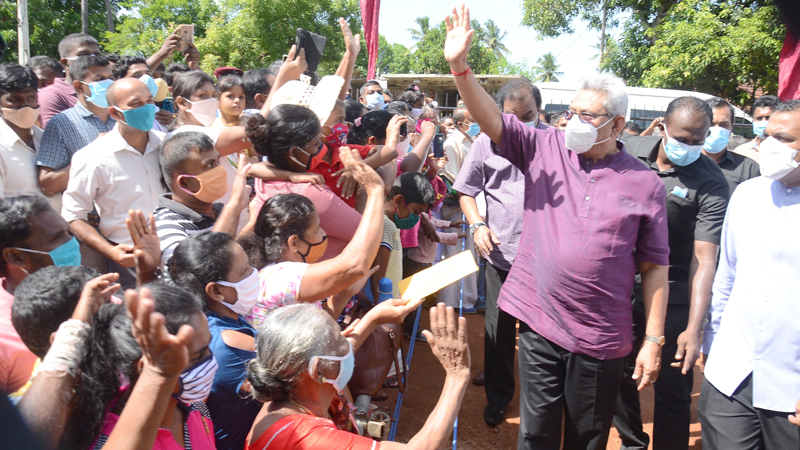November 16 in 2019 stands out historic in Sri Lanka’s presidential election chronicle. Around 35 candidates contested for the country’s topmost administrative seat. In a not-so-surprising result, a leader with a unique political vision emerged victorious. Gotabaya Rajapaksa was already a political brand though he was not a politician himself before taking oaths as Sri Lanka’s Seventh Executive President at the sacred precincts of Ruvanveliseya, Anuradhapura. The rest is history which needs revisiting as we now approach his first anniversary in office.
 Professor Charitha Herath MP |
Sri Lanka Podujana Peramuna Parliamentarian, Professor Charitha Herath, keys out five specific domains that gained prominence during the first year of the Gotabaya Rajapaksa Presidency. The five domains, economy, defence, foreign relations, social welfare and health stood in a dismal state prior to his presidency. The very domains much neglected during the previous regime prospered under his leadership.
Administrative efficiency
“The last year’s Presidential Election results draw our attention to one strong element. The country was constantly and persistently in search of a new leadership. Gotabaya Rajapaksa fitted in more than enough. His manifesto, Saubagye Dekma, played a pivotal role in the campaign,” Professor Herath MP elucidates.
His motto, Do your duty I will do mine, ensured that he cuts a dash above the rest as a presidential candidate. It was his first entry in a political election. None the less, it is the uppermost among the elections. Seemingly a tough game, Rajapaksa nevertheless aced it as he was a man of no hollow promises.
He entered the game with a proven track record of administrative efficiency.
Over half of the country accepted Rajapaksa’s words and did their duty. Rajapaksa, on the other hand, proved his mettle in his first year as the Seventh Executive President of Sri Lanka.
“Uncertainty reigned over the country’s economy, defence, foreign relations, social welfare and health. This uncertainty provided President Rajapaksa with an opportunity. Yet he had two major hurdles. 19th Amendment was one. The pandemic was the other,” Professor Herath MP notes.
With the 19th Amendment in force, the President was not in a position to dissolve Parliament until it is four and a half years old. With the pandemic spreading tentacles over the country, President Rajapaksa had to shoulder governance with an uncooperative parliament (where sovereignty was no longer represented). He had to grapple with that reality for eight months.
Blissful factor
For a non-political leader, it would have been a nightmare. Gotabaya Rajapaksa’s administrative experience and expertise was a blissful factor in his presidency. In due course, the President’s pragmatic leadership positioned the country well above the neighbouring countries in the region in terms of death rate and CoVid19-affected during its first wave.
“But he did not remain there. President Rajapaksa was overseeing other key areas as well. When he took over the reins, the country’s economy was apparently in a sorry state. Our debt has been experiencing an incessant surge since Independence. The amount to be settled keeps on growing every year. Our country depends largely on foreign income which is threefold: export industry, tourism and expatriates. CoVid19 put a strong freezer on these sources. So the challenge loomed largely.”
Professor Herath assesses how President Rajapaksa took several remedial measures. While maintaining exports to a certain extent, the country is gradually being introduced to import substitutes. Farming was encouraged.
“To assess the Rajapaksa presidency, we must investigate the state of affairs before he assumed office. Remember, the country experienced a crisis with a fluctuating fuel price based on a price formula.”
Electricity, water supply and fuel consumption remain at an affordable level now. With no price formula in force, the fuel prices do not fluctuate.
Health sector
“Even during the COVID crisis, the government looked into social welfare. The Samurdhi families were taken care of. The families affected by COVID were taken care of. We know very well that these people faced certain impediments during the previous government. Even in foreign relations, Sri Lanka steadied against itself in the international platform during the previous regime. President Rajapaksa’s government took remedial steps,” Professor Charitha Herath MP explains.
Health sector gained major benefits under the Rajapaksa presidency, as health safety was given prominence.
Even amid an uncooperative parliament, and an absence of a parliament, President Gotabaya Rajapaksa faced what no other president did even dream of. On this eve of the first anniversary, we are witnessing the accomplishment of that courageous leadership.



